Global Business Environment Analysis and Strategic Recommendations
VerifiedAdded on 2023/01/17
|18
|6190
|75
Report
AI Summary
This report provides a comprehensive analysis of the global business environment, examining key factors impacting global commerce and trade, such as political, economic, social, technological, legal, and environmental influences. It delves into the complexities of strategic challenges faced by organizations in a global context, including foreign laws and regulations, international accounting, cost calculations, currency fluctuations, political risks, supply chain management, and communication and cultural differences. The report further explores the influence of globalization on organizational governance, leadership, structure, culture, and function, as well as the impact of ethical and sustainable globalization on business operations. It also discusses different approaches to decision-making in a global context and outlines various routes to internationalization, including potential barriers. The report concludes with an overview of how businesses can navigate the global environment effectively, providing insights and recommendations for strategic planning and operational success. This report is intended for students and professionals interested in understanding the complexities of international business.
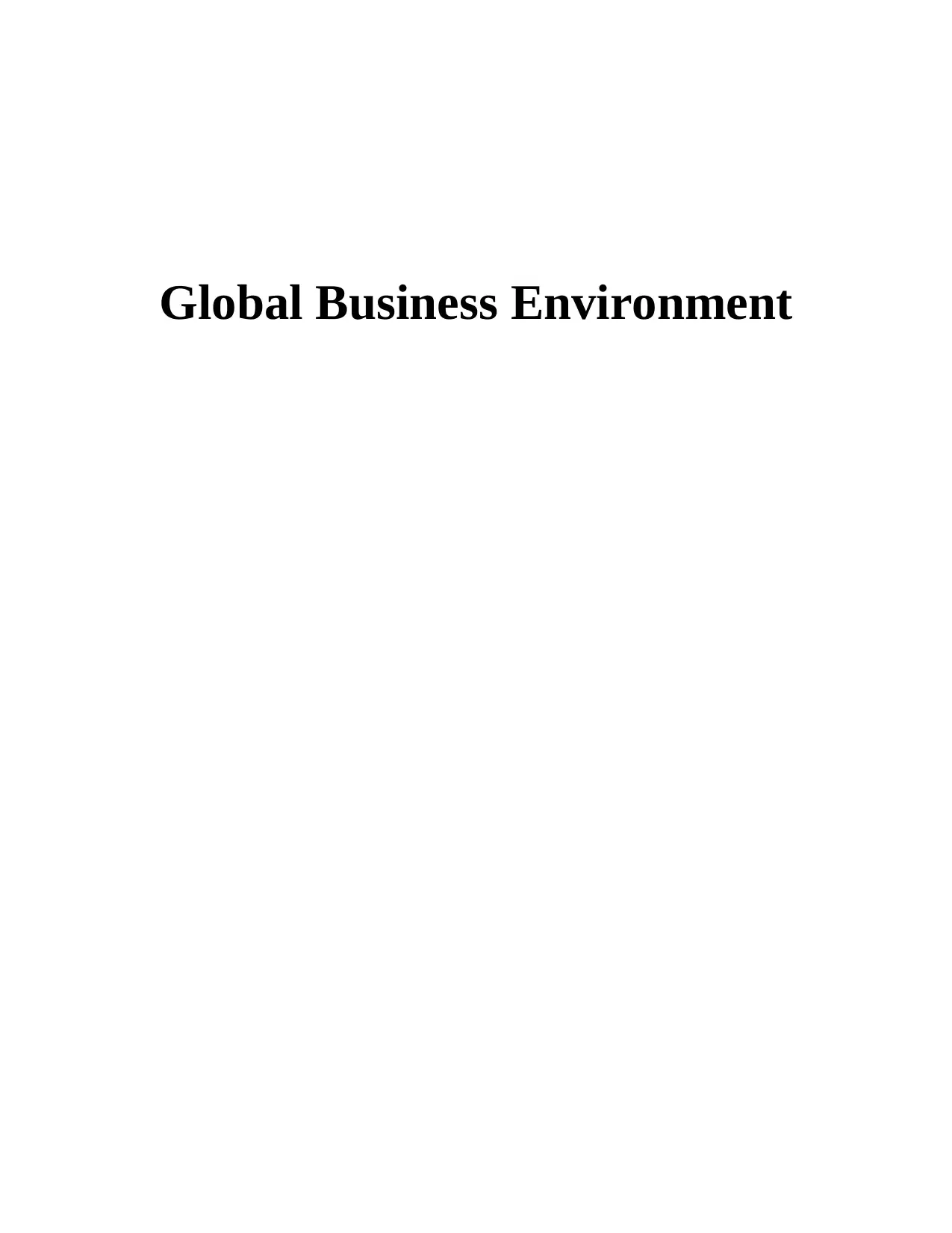
Global Business Environment
Paraphrase This Document
Need a fresh take? Get an instant paraphrase of this document with our AI Paraphraser
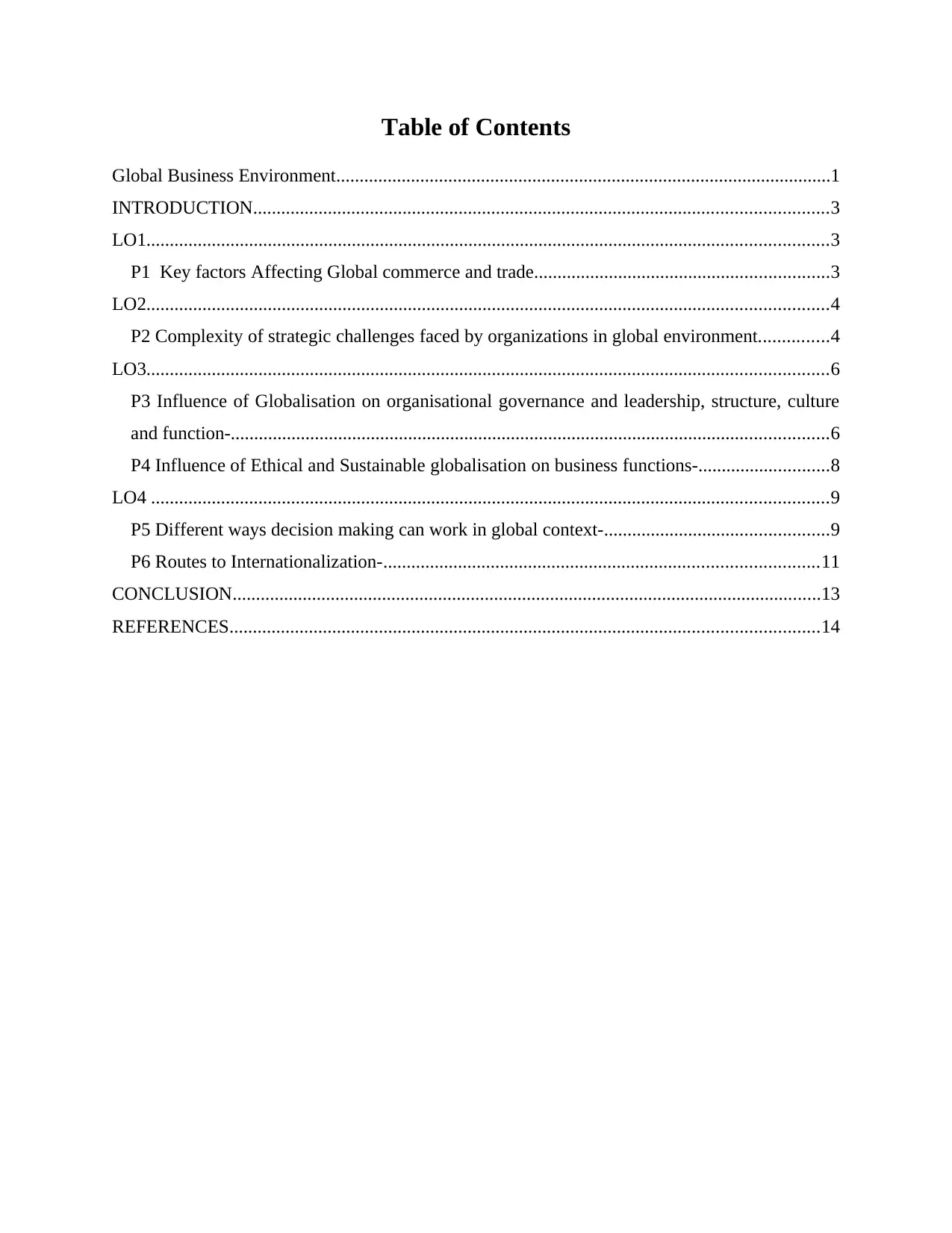
Table of Contents
Global Business Environment..........................................................................................................1
INTRODUCTION...........................................................................................................................3
LO1..................................................................................................................................................3
P1 Key factors Affecting Global commerce and trade...............................................................3
LO2..................................................................................................................................................4
P2 Complexity of strategic challenges faced by organizations in global environment...............4
LO3..................................................................................................................................................6
P3 Influence of Globalisation on organisational governance and leadership, structure, culture
and function-................................................................................................................................6
P4 Influence of Ethical and Sustainable globalisation on business functions-............................8
LO4 .................................................................................................................................................9
P5 Different ways decision making can work in global context-................................................9
P6 Routes to Internationalization-.............................................................................................11
CONCLUSION..............................................................................................................................13
REFERENCES..............................................................................................................................14
Global Business Environment..........................................................................................................1
INTRODUCTION...........................................................................................................................3
LO1..................................................................................................................................................3
P1 Key factors Affecting Global commerce and trade...............................................................3
LO2..................................................................................................................................................4
P2 Complexity of strategic challenges faced by organizations in global environment...............4
LO3..................................................................................................................................................6
P3 Influence of Globalisation on organisational governance and leadership, structure, culture
and function-................................................................................................................................6
P4 Influence of Ethical and Sustainable globalisation on business functions-............................8
LO4 .................................................................................................................................................9
P5 Different ways decision making can work in global context-................................................9
P6 Routes to Internationalization-.............................................................................................11
CONCLUSION..............................................................................................................................13
REFERENCES..............................................................................................................................14
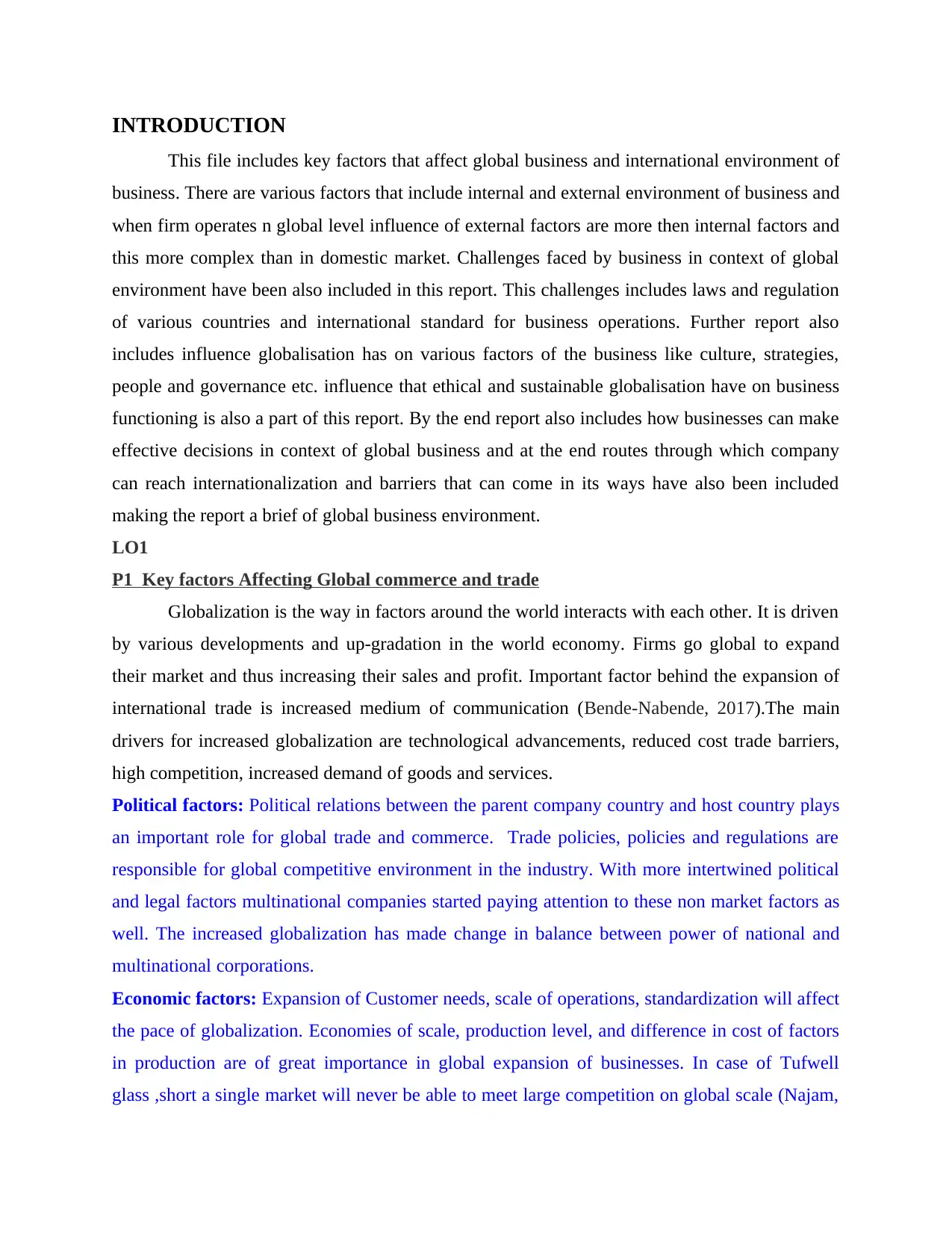
INTRODUCTION
This file includes key factors that affect global business and international environment of
business. There are various factors that include internal and external environment of business and
when firm operates n global level influence of external factors are more then internal factors and
this more complex than in domestic market. Challenges faced by business in context of global
environment have been also included in this report. This challenges includes laws and regulation
of various countries and international standard for business operations. Further report also
includes influence globalisation has on various factors of the business like culture, strategies,
people and governance etc. influence that ethical and sustainable globalisation have on business
functioning is also a part of this report. By the end report also includes how businesses can make
effective decisions in context of global business and at the end routes through which company
can reach internationalization and barriers that can come in its ways have also been included
making the report a brief of global business environment.
LO1
P1 Key factors Affecting Global commerce and trade
Globalization is the way in factors around the world interacts with each other. It is driven
by various developments and up-gradation in the world economy. Firms go global to expand
their market and thus increasing their sales and profit. Important factor behind the expansion of
international trade is increased medium of communication (Bende-Nabende, 2017).The main
drivers for increased globalization are technological advancements, reduced cost trade barriers,
high competition, increased demand of goods and services.
Political factors: Political relations between the parent company country and host country plays
an important role for global trade and commerce. Trade policies, policies and regulations are
responsible for global competitive environment in the industry. With more intertwined political
and legal factors multinational companies started paying attention to these non market factors as
well. The increased globalization has made change in balance between power of national and
multinational corporations.
Economic factors: Expansion of Customer needs, scale of operations, standardization will affect
the pace of globalization. Economies of scale, production level, and difference in cost of factors
in production are of great importance in global expansion of businesses. In case of Tufwell
glass ,short a single market will never be able to meet large competition on global scale (Najam,
This file includes key factors that affect global business and international environment of
business. There are various factors that include internal and external environment of business and
when firm operates n global level influence of external factors are more then internal factors and
this more complex than in domestic market. Challenges faced by business in context of global
environment have been also included in this report. This challenges includes laws and regulation
of various countries and international standard for business operations. Further report also
includes influence globalisation has on various factors of the business like culture, strategies,
people and governance etc. influence that ethical and sustainable globalisation have on business
functioning is also a part of this report. By the end report also includes how businesses can make
effective decisions in context of global business and at the end routes through which company
can reach internationalization and barriers that can come in its ways have also been included
making the report a brief of global business environment.
LO1
P1 Key factors Affecting Global commerce and trade
Globalization is the way in factors around the world interacts with each other. It is driven
by various developments and up-gradation in the world economy. Firms go global to expand
their market and thus increasing their sales and profit. Important factor behind the expansion of
international trade is increased medium of communication (Bende-Nabende, 2017).The main
drivers for increased globalization are technological advancements, reduced cost trade barriers,
high competition, increased demand of goods and services.
Political factors: Political relations between the parent company country and host country plays
an important role for global trade and commerce. Trade policies, policies and regulations are
responsible for global competitive environment in the industry. With more intertwined political
and legal factors multinational companies started paying attention to these non market factors as
well. The increased globalization has made change in balance between power of national and
multinational corporations.
Economic factors: Expansion of Customer needs, scale of operations, standardization will affect
the pace of globalization. Economies of scale, production level, and difference in cost of factors
in production are of great importance in global expansion of businesses. In case of Tufwell
glass ,short a single market will never be able to meet large competition on global scale (Najam,
⊘ This is a preview!⊘
Do you want full access?
Subscribe today to unlock all pages.

Trusted by 1+ million students worldwide
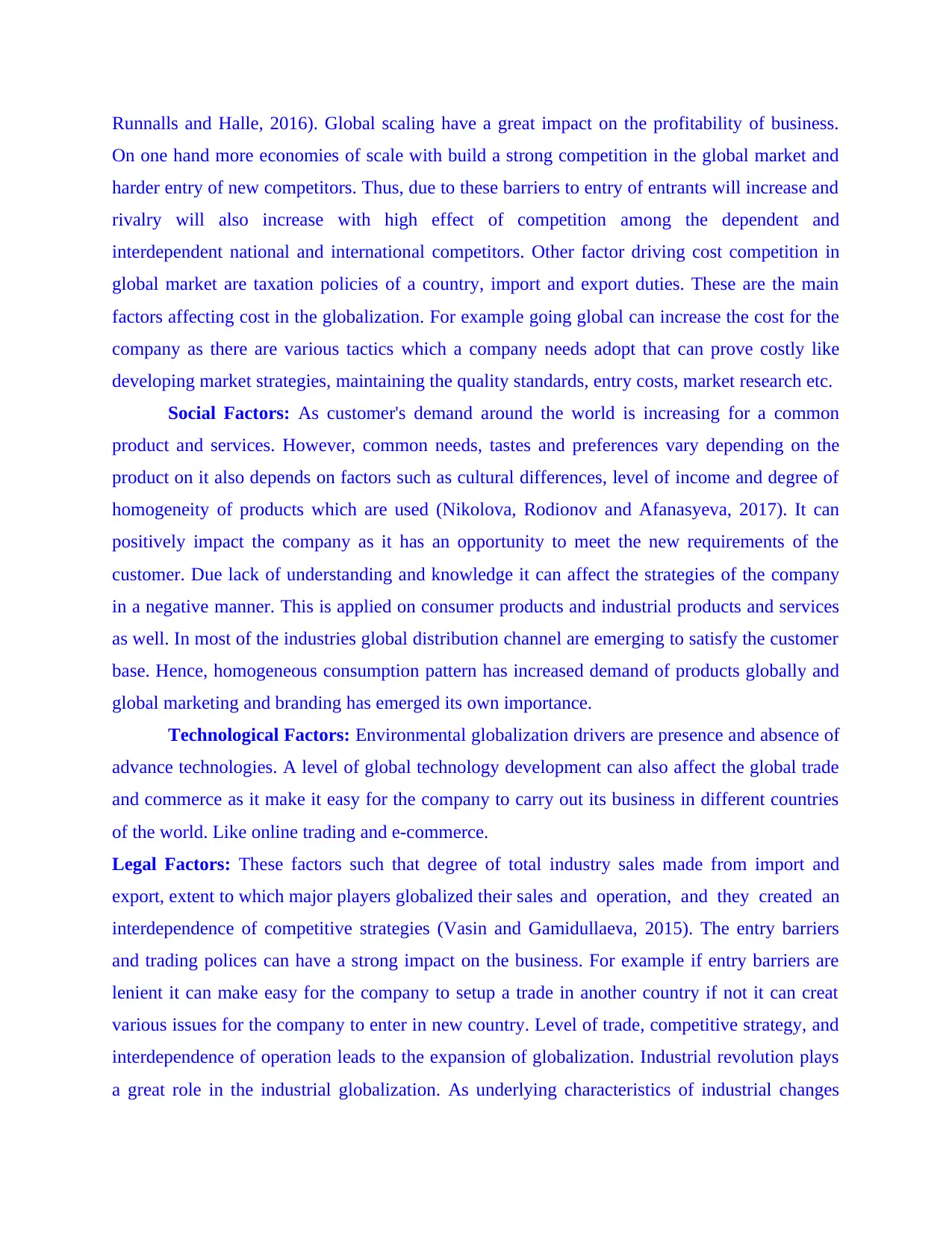
Runnalls and Halle, 2016). Global scaling have a great impact on the profitability of business.
On one hand more economies of scale with build a strong competition in the global market and
harder entry of new competitors. Thus, due to these barriers to entry of entrants will increase and
rivalry will also increase with high effect of competition among the dependent and
interdependent national and international competitors. Other factor driving cost competition in
global market are taxation policies of a country, import and export duties. These are the main
factors affecting cost in the globalization. For example going global can increase the cost for the
company as there are various tactics which a company needs adopt that can prove costly like
developing market strategies, maintaining the quality standards, entry costs, market research etc.
Social Factors: As customer's demand around the world is increasing for a common
product and services. However, common needs, tastes and preferences vary depending on the
product on it also depends on factors such as cultural differences, level of income and degree of
homogeneity of products which are used (Nikolova, Rodionov and Afanasyeva, 2017). It can
positively impact the company as it has an opportunity to meet the new requirements of the
customer. Due lack of understanding and knowledge it can affect the strategies of the company
in a negative manner. This is applied on consumer products and industrial products and services
as well. In most of the industries global distribution channel are emerging to satisfy the customer
base. Hence, homogeneous consumption pattern has increased demand of products globally and
global marketing and branding has emerged its own importance.
Technological Factors: Environmental globalization drivers are presence and absence of
advance technologies. A level of global technology development can also affect the global trade
and commerce as it make it easy for the company to carry out its business in different countries
of the world. Like online trading and e-commerce.
Legal Factors: These factors such that degree of total industry sales made from import and
export, extent to which major players globalized their sales and operation, and they created an
interdependence of competitive strategies (Vasin and Gamidullaeva, 2015). The entry barriers
and trading polices can have a strong impact on the business. For example if entry barriers are
lenient it can make easy for the company to setup a trade in another country if not it can creat
various issues for the company to enter in new country. Level of trade, competitive strategy, and
interdependence of operation leads to the expansion of globalization. Industrial revolution plays
a great role in the industrial globalization. As underlying characteristics of industrial changes
On one hand more economies of scale with build a strong competition in the global market and
harder entry of new competitors. Thus, due to these barriers to entry of entrants will increase and
rivalry will also increase with high effect of competition among the dependent and
interdependent national and international competitors. Other factor driving cost competition in
global market are taxation policies of a country, import and export duties. These are the main
factors affecting cost in the globalization. For example going global can increase the cost for the
company as there are various tactics which a company needs adopt that can prove costly like
developing market strategies, maintaining the quality standards, entry costs, market research etc.
Social Factors: As customer's demand around the world is increasing for a common
product and services. However, common needs, tastes and preferences vary depending on the
product on it also depends on factors such as cultural differences, level of income and degree of
homogeneity of products which are used (Nikolova, Rodionov and Afanasyeva, 2017). It can
positively impact the company as it has an opportunity to meet the new requirements of the
customer. Due lack of understanding and knowledge it can affect the strategies of the company
in a negative manner. This is applied on consumer products and industrial products and services
as well. In most of the industries global distribution channel are emerging to satisfy the customer
base. Hence, homogeneous consumption pattern has increased demand of products globally and
global marketing and branding has emerged its own importance.
Technological Factors: Environmental globalization drivers are presence and absence of
advance technologies. A level of global technology development can also affect the global trade
and commerce as it make it easy for the company to carry out its business in different countries
of the world. Like online trading and e-commerce.
Legal Factors: These factors such that degree of total industry sales made from import and
export, extent to which major players globalized their sales and operation, and they created an
interdependence of competitive strategies (Vasin and Gamidullaeva, 2015). The entry barriers
and trading polices can have a strong impact on the business. For example if entry barriers are
lenient it can make easy for the company to setup a trade in another country if not it can creat
various issues for the company to enter in new country. Level of trade, competitive strategy, and
interdependence of operation leads to the expansion of globalization. Industrial revolution plays
a great role in the industrial globalization. As underlying characteristics of industrial changes
Paraphrase This Document
Need a fresh take? Get an instant paraphrase of this document with our AI Paraphraser
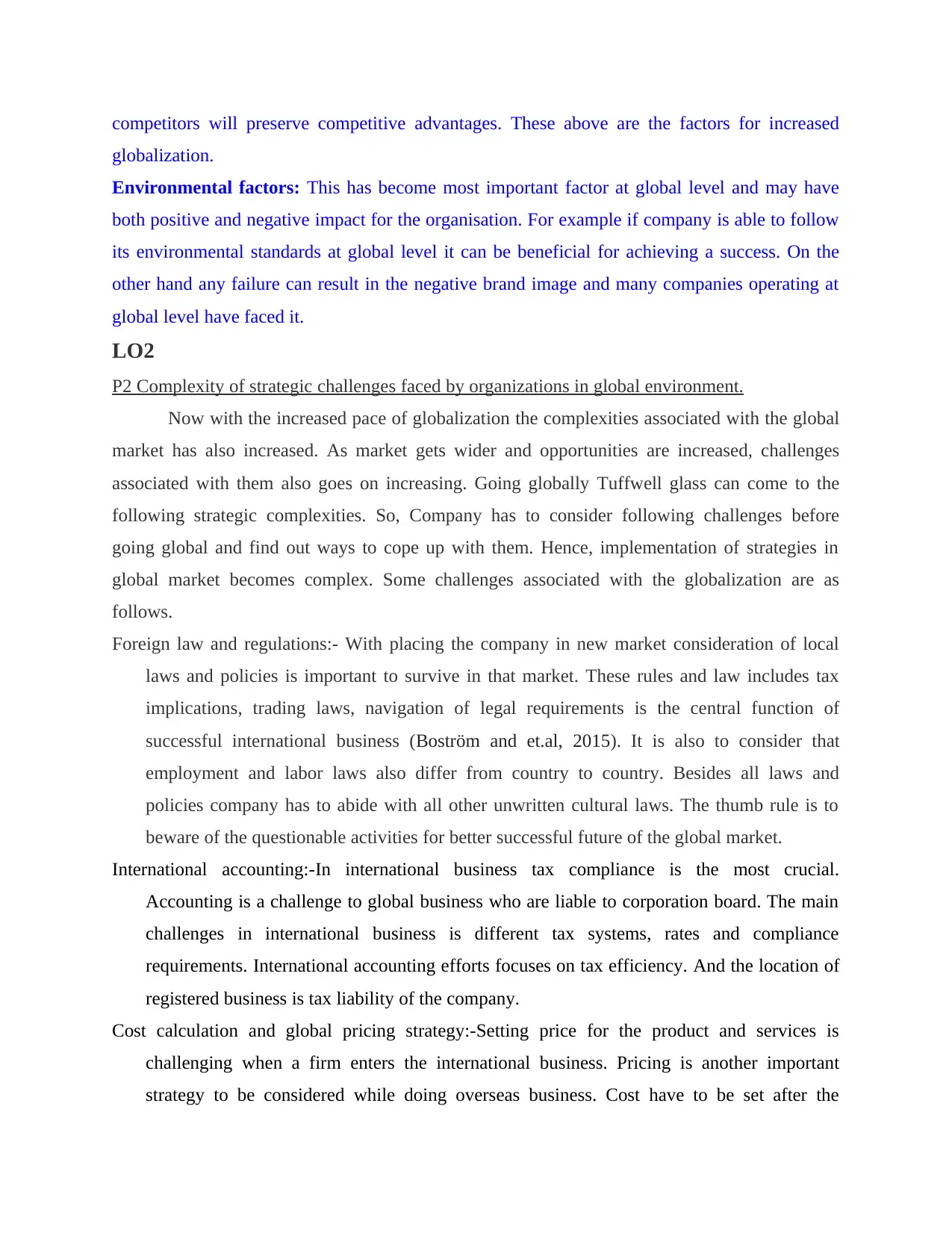
competitors will preserve competitive advantages. These above are the factors for increased
globalization.
Environmental factors: This has become most important factor at global level and may have
both positive and negative impact for the organisation. For example if company is able to follow
its environmental standards at global level it can be beneficial for achieving a success. On the
other hand any failure can result in the negative brand image and many companies operating at
global level have faced it.
LO2
P2 Complexity of strategic challenges faced by organizations in global environment.
Now with the increased pace of globalization the complexities associated with the global
market has also increased. As market gets wider and opportunities are increased, challenges
associated with them also goes on increasing. Going globally Tuffwell glass can come to the
following strategic complexities. So, Company has to consider following challenges before
going global and find out ways to cope up with them. Hence, implementation of strategies in
global market becomes complex. Some challenges associated with the globalization are as
follows.
Foreign law and regulations:- With placing the company in new market consideration of local
laws and policies is important to survive in that market. These rules and law includes tax
implications, trading laws, navigation of legal requirements is the central function of
successful international business (Boström and et.al, 2015). It is also to consider that
employment and labor laws also differ from country to country. Besides all laws and
policies company has to abide with all other unwritten cultural laws. The thumb rule is to
beware of the questionable activities for better successful future of the global market.
International accounting:-In international business tax compliance is the most crucial.
Accounting is a challenge to global business who are liable to corporation board. The main
challenges in international business is different tax systems, rates and compliance
requirements. International accounting efforts focuses on tax efficiency. And the location of
registered business is tax liability of the company.
Cost calculation and global pricing strategy:-Setting price for the product and services is
challenging when a firm enters the international business. Pricing is another important
strategy to be considered while doing overseas business. Cost have to be set after the
globalization.
Environmental factors: This has become most important factor at global level and may have
both positive and negative impact for the organisation. For example if company is able to follow
its environmental standards at global level it can be beneficial for achieving a success. On the
other hand any failure can result in the negative brand image and many companies operating at
global level have faced it.
LO2
P2 Complexity of strategic challenges faced by organizations in global environment.
Now with the increased pace of globalization the complexities associated with the global
market has also increased. As market gets wider and opportunities are increased, challenges
associated with them also goes on increasing. Going globally Tuffwell glass can come to the
following strategic complexities. So, Company has to consider following challenges before
going global and find out ways to cope up with them. Hence, implementation of strategies in
global market becomes complex. Some challenges associated with the globalization are as
follows.
Foreign law and regulations:- With placing the company in new market consideration of local
laws and policies is important to survive in that market. These rules and law includes tax
implications, trading laws, navigation of legal requirements is the central function of
successful international business (Boström and et.al, 2015). It is also to consider that
employment and labor laws also differ from country to country. Besides all laws and
policies company has to abide with all other unwritten cultural laws. The thumb rule is to
beware of the questionable activities for better successful future of the global market.
International accounting:-In international business tax compliance is the most crucial.
Accounting is a challenge to global business who are liable to corporation board. The main
challenges in international business is different tax systems, rates and compliance
requirements. International accounting efforts focuses on tax efficiency. And the location of
registered business is tax liability of the company.
Cost calculation and global pricing strategy:-Setting price for the product and services is
challenging when a firm enters the international business. Pricing is another important
strategy to be considered while doing overseas business. Cost have to be set after the
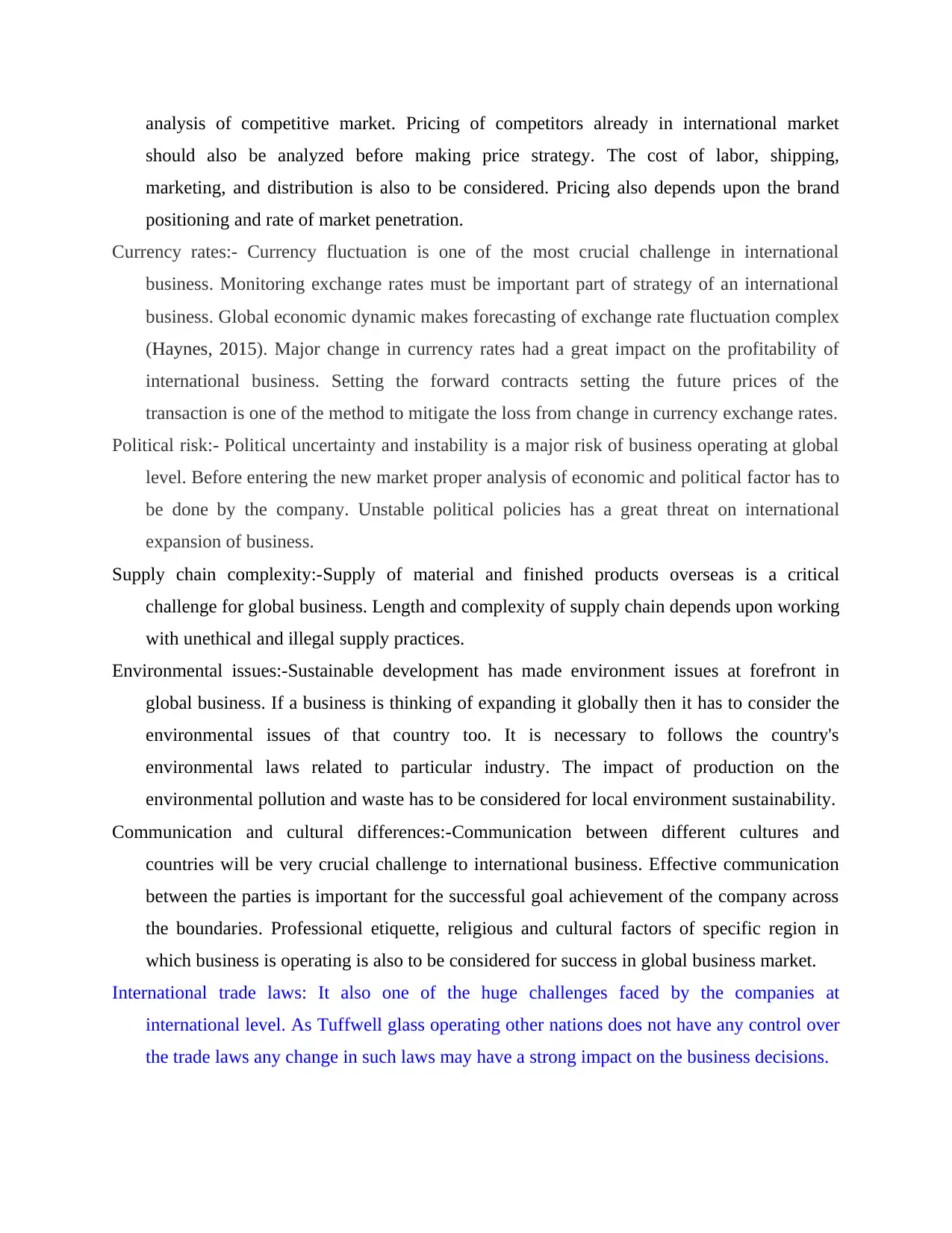
analysis of competitive market. Pricing of competitors already in international market
should also be analyzed before making price strategy. The cost of labor, shipping,
marketing, and distribution is also to be considered. Pricing also depends upon the brand
positioning and rate of market penetration.
Currency rates:- Currency fluctuation is one of the most crucial challenge in international
business. Monitoring exchange rates must be important part of strategy of an international
business. Global economic dynamic makes forecasting of exchange rate fluctuation complex
(Haynes, 2015). Major change in currency rates had a great impact on the profitability of
international business. Setting the forward contracts setting the future prices of the
transaction is one of the method to mitigate the loss from change in currency exchange rates.
Political risk:- Political uncertainty and instability is a major risk of business operating at global
level. Before entering the new market proper analysis of economic and political factor has to
be done by the company. Unstable political policies has a great threat on international
expansion of business.
Supply chain complexity:-Supply of material and finished products overseas is a critical
challenge for global business. Length and complexity of supply chain depends upon working
with unethical and illegal supply practices.
Environmental issues:-Sustainable development has made environment issues at forefront in
global business. If a business is thinking of expanding it globally then it has to consider the
environmental issues of that country too. It is necessary to follows the country's
environmental laws related to particular industry. The impact of production on the
environmental pollution and waste has to be considered for local environment sustainability.
Communication and cultural differences:-Communication between different cultures and
countries will be very crucial challenge to international business. Effective communication
between the parties is important for the successful goal achievement of the company across
the boundaries. Professional etiquette, religious and cultural factors of specific region in
which business is operating is also to be considered for success in global business market.
International trade laws: It also one of the huge challenges faced by the companies at
international level. As Tuffwell glass operating other nations does not have any control over
the trade laws any change in such laws may have a strong impact on the business decisions.
should also be analyzed before making price strategy. The cost of labor, shipping,
marketing, and distribution is also to be considered. Pricing also depends upon the brand
positioning and rate of market penetration.
Currency rates:- Currency fluctuation is one of the most crucial challenge in international
business. Monitoring exchange rates must be important part of strategy of an international
business. Global economic dynamic makes forecasting of exchange rate fluctuation complex
(Haynes, 2015). Major change in currency rates had a great impact on the profitability of
international business. Setting the forward contracts setting the future prices of the
transaction is one of the method to mitigate the loss from change in currency exchange rates.
Political risk:- Political uncertainty and instability is a major risk of business operating at global
level. Before entering the new market proper analysis of economic and political factor has to
be done by the company. Unstable political policies has a great threat on international
expansion of business.
Supply chain complexity:-Supply of material and finished products overseas is a critical
challenge for global business. Length and complexity of supply chain depends upon working
with unethical and illegal supply practices.
Environmental issues:-Sustainable development has made environment issues at forefront in
global business. If a business is thinking of expanding it globally then it has to consider the
environmental issues of that country too. It is necessary to follows the country's
environmental laws related to particular industry. The impact of production on the
environmental pollution and waste has to be considered for local environment sustainability.
Communication and cultural differences:-Communication between different cultures and
countries will be very crucial challenge to international business. Effective communication
between the parties is important for the successful goal achievement of the company across
the boundaries. Professional etiquette, religious and cultural factors of specific region in
which business is operating is also to be considered for success in global business market.
International trade laws: It also one of the huge challenges faced by the companies at
international level. As Tuffwell glass operating other nations does not have any control over
the trade laws any change in such laws may have a strong impact on the business decisions.
⊘ This is a preview!⊘
Do you want full access?
Subscribe today to unlock all pages.

Trusted by 1+ million students worldwide
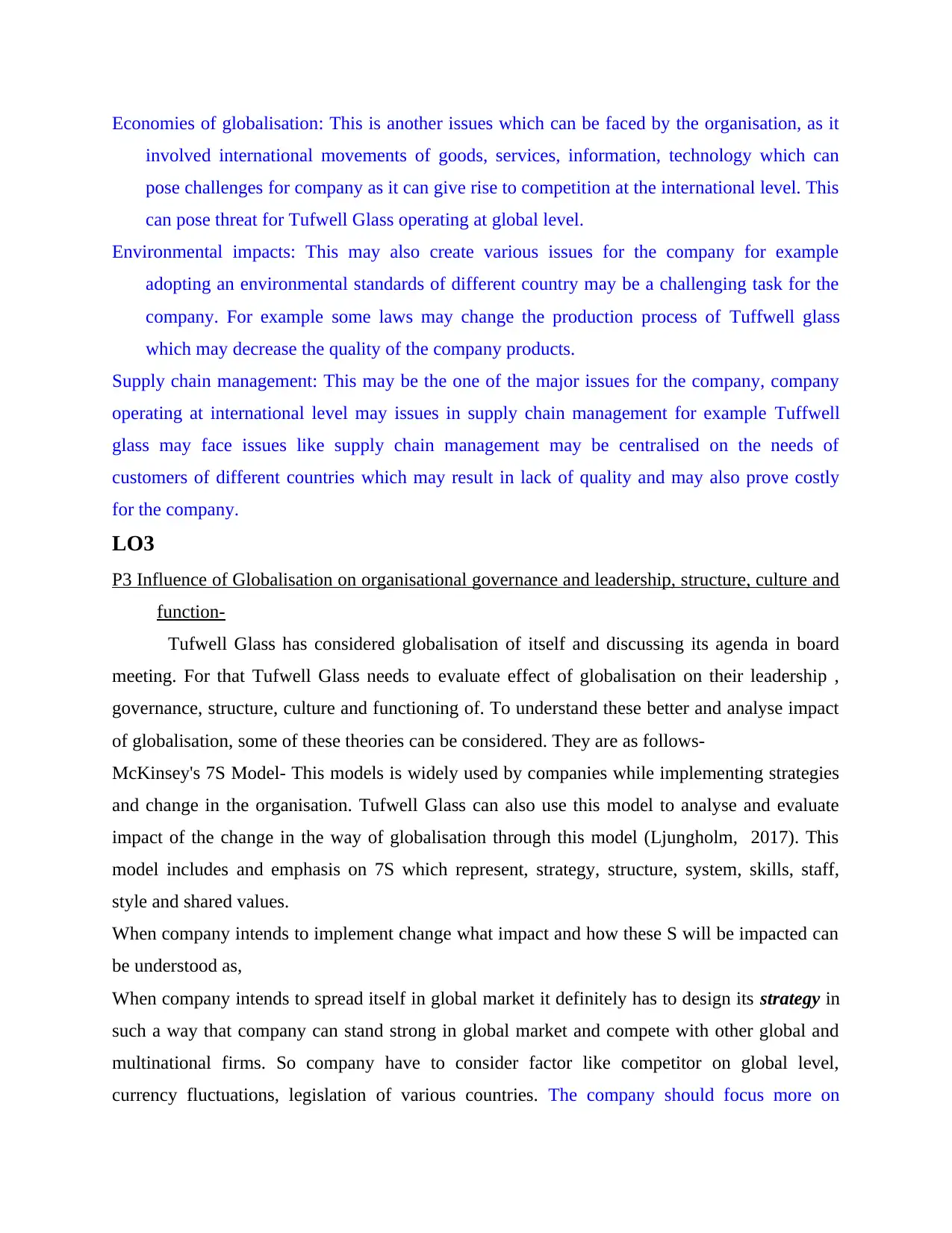
Economies of globalisation: This is another issues which can be faced by the organisation, as it
involved international movements of goods, services, information, technology which can
pose challenges for company as it can give rise to competition at the international level. This
can pose threat for Tufwell Glass operating at global level.
Environmental impacts: This may also create various issues for the company for example
adopting an environmental standards of different country may be a challenging task for the
company. For example some laws may change the production process of Tuffwell glass
which may decrease the quality of the company products.
Supply chain management: This may be the one of the major issues for the company, company
operating at international level may issues in supply chain management for example Tuffwell
glass may face issues like supply chain management may be centralised on the needs of
customers of different countries which may result in lack of quality and may also prove costly
for the company.
LO3
P3 Influence of Globalisation on organisational governance and leadership, structure, culture and
function-
Tufwell Glass has considered globalisation of itself and discussing its agenda in board
meeting. For that Tufwell Glass needs to evaluate effect of globalisation on their leadership ,
governance, structure, culture and functioning of. To understand these better and analyse impact
of globalisation, some of these theories can be considered. They are as follows-
McKinsey's 7S Model- This models is widely used by companies while implementing strategies
and change in the organisation. Tufwell Glass can also use this model to analyse and evaluate
impact of the change in the way of globalisation through this model (Ljungholm, 2017). This
model includes and emphasis on 7S which represent, strategy, structure, system, skills, staff,
style and shared values.
When company intends to implement change what impact and how these S will be impacted can
be understood as,
When company intends to spread itself in global market it definitely has to design its strategy in
such a way that company can stand strong in global market and compete with other global and
multinational firms. So company have to consider factor like competitor on global level,
currency fluctuations, legislation of various countries. The company should focus more on
involved international movements of goods, services, information, technology which can
pose challenges for company as it can give rise to competition at the international level. This
can pose threat for Tufwell Glass operating at global level.
Environmental impacts: This may also create various issues for the company for example
adopting an environmental standards of different country may be a challenging task for the
company. For example some laws may change the production process of Tuffwell glass
which may decrease the quality of the company products.
Supply chain management: This may be the one of the major issues for the company, company
operating at international level may issues in supply chain management for example Tuffwell
glass may face issues like supply chain management may be centralised on the needs of
customers of different countries which may result in lack of quality and may also prove costly
for the company.
LO3
P3 Influence of Globalisation on organisational governance and leadership, structure, culture and
function-
Tufwell Glass has considered globalisation of itself and discussing its agenda in board
meeting. For that Tufwell Glass needs to evaluate effect of globalisation on their leadership ,
governance, structure, culture and functioning of. To understand these better and analyse impact
of globalisation, some of these theories can be considered. They are as follows-
McKinsey's 7S Model- This models is widely used by companies while implementing strategies
and change in the organisation. Tufwell Glass can also use this model to analyse and evaluate
impact of the change in the way of globalisation through this model (Ljungholm, 2017). This
model includes and emphasis on 7S which represent, strategy, structure, system, skills, staff,
style and shared values.
When company intends to implement change what impact and how these S will be impacted can
be understood as,
When company intends to spread itself in global market it definitely has to design its strategy in
such a way that company can stand strong in global market and compete with other global and
multinational firms. So company have to consider factor like competitor on global level,
currency fluctuations, legislation of various countries. The company should focus more on
Paraphrase This Document
Need a fresh take? Get an instant paraphrase of this document with our AI Paraphraser
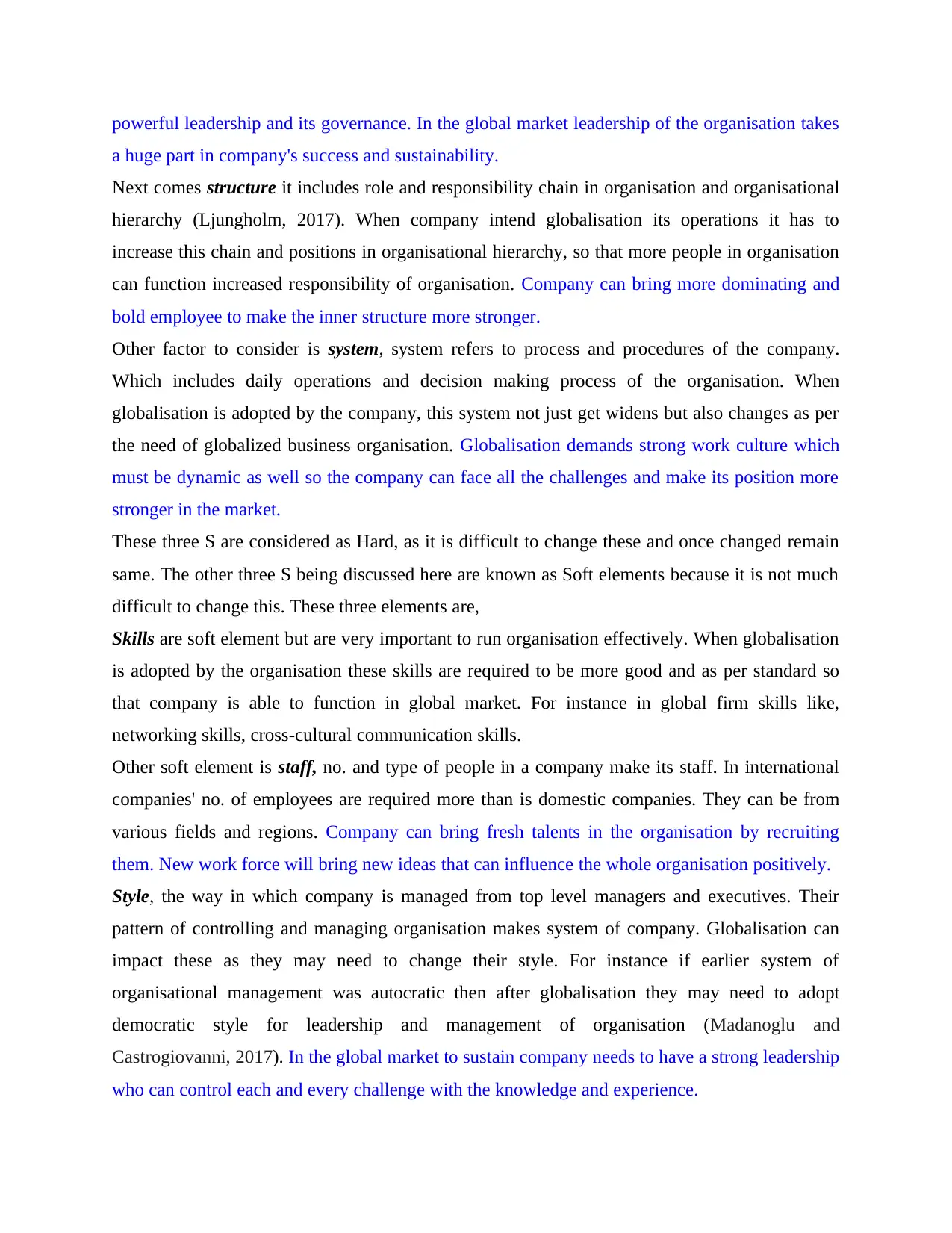
powerful leadership and its governance. In the global market leadership of the organisation takes
a huge part in company's success and sustainability.
Next comes structure it includes role and responsibility chain in organisation and organisational
hierarchy (Ljungholm, 2017). When company intend globalisation its operations it has to
increase this chain and positions in organisational hierarchy, so that more people in organisation
can function increased responsibility of organisation. Company can bring more dominating and
bold employee to make the inner structure more stronger.
Other factor to consider is system, system refers to process and procedures of the company.
Which includes daily operations and decision making process of the organisation. When
globalisation is adopted by the company, this system not just get widens but also changes as per
the need of globalized business organisation. Globalisation demands strong work culture which
must be dynamic as well so the company can face all the challenges and make its position more
stronger in the market.
These three S are considered as Hard, as it is difficult to change these and once changed remain
same. The other three S being discussed here are known as Soft elements because it is not much
difficult to change this. These three elements are,
Skills are soft element but are very important to run organisation effectively. When globalisation
is adopted by the organisation these skills are required to be more good and as per standard so
that company is able to function in global market. For instance in global firm skills like,
networking skills, cross-cultural communication skills.
Other soft element is staff, no. and type of people in a company make its staff. In international
companies' no. of employees are required more than is domestic companies. They can be from
various fields and regions. Company can bring fresh talents in the organisation by recruiting
them. New work force will bring new ideas that can influence the whole organisation positively.
Style, the way in which company is managed from top level managers and executives. Their
pattern of controlling and managing organisation makes system of company. Globalisation can
impact these as they may need to change their style. For instance if earlier system of
organisational management was autocratic then after globalisation they may need to adopt
democratic style for leadership and management of organisation (Madanoglu and
Castrogiovanni, 2017). In the global market to sustain company needs to have a strong leadership
who can control each and every challenge with the knowledge and experience.
a huge part in company's success and sustainability.
Next comes structure it includes role and responsibility chain in organisation and organisational
hierarchy (Ljungholm, 2017). When company intend globalisation its operations it has to
increase this chain and positions in organisational hierarchy, so that more people in organisation
can function increased responsibility of organisation. Company can bring more dominating and
bold employee to make the inner structure more stronger.
Other factor to consider is system, system refers to process and procedures of the company.
Which includes daily operations and decision making process of the organisation. When
globalisation is adopted by the company, this system not just get widens but also changes as per
the need of globalized business organisation. Globalisation demands strong work culture which
must be dynamic as well so the company can face all the challenges and make its position more
stronger in the market.
These three S are considered as Hard, as it is difficult to change these and once changed remain
same. The other three S being discussed here are known as Soft elements because it is not much
difficult to change this. These three elements are,
Skills are soft element but are very important to run organisation effectively. When globalisation
is adopted by the organisation these skills are required to be more good and as per standard so
that company is able to function in global market. For instance in global firm skills like,
networking skills, cross-cultural communication skills.
Other soft element is staff, no. and type of people in a company make its staff. In international
companies' no. of employees are required more than is domestic companies. They can be from
various fields and regions. Company can bring fresh talents in the organisation by recruiting
them. New work force will bring new ideas that can influence the whole organisation positively.
Style, the way in which company is managed from top level managers and executives. Their
pattern of controlling and managing organisation makes system of company. Globalisation can
impact these as they may need to change their style. For instance if earlier system of
organisational management was autocratic then after globalisation they may need to adopt
democratic style for leadership and management of organisation (Madanoglu and
Castrogiovanni, 2017). In the global market to sustain company needs to have a strong leadership
who can control each and every challenge with the knowledge and experience.
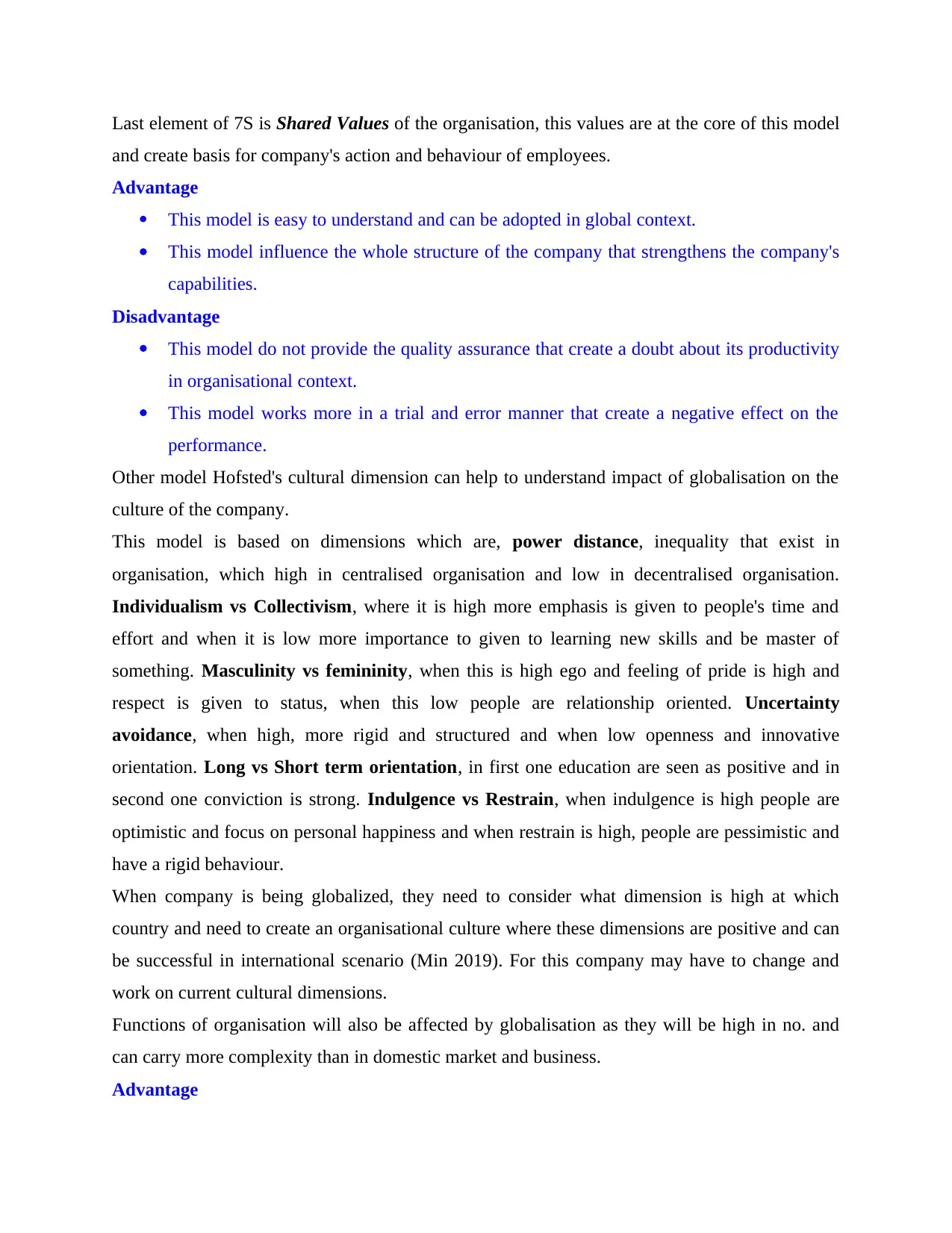
Last element of 7S is Shared Values of the organisation, this values are at the core of this model
and create basis for company's action and behaviour of employees.
Advantage
This model is easy to understand and can be adopted in global context.
This model influence the whole structure of the company that strengthens the company's
capabilities.
Disadvantage
This model do not provide the quality assurance that create a doubt about its productivity
in organisational context.
This model works more in a trial and error manner that create a negative effect on the
performance.
Other model Hofsted's cultural dimension can help to understand impact of globalisation on the
culture of the company.
This model is based on dimensions which are, power distance, inequality that exist in
organisation, which high in centralised organisation and low in decentralised organisation.
Individualism vs Collectivism, where it is high more emphasis is given to people's time and
effort and when it is low more importance to given to learning new skills and be master of
something. Masculinity vs femininity, when this is high ego and feeling of pride is high and
respect is given to status, when this low people are relationship oriented. Uncertainty
avoidance, when high, more rigid and structured and when low openness and innovative
orientation. Long vs Short term orientation, in first one education are seen as positive and in
second one conviction is strong. Indulgence vs Restrain, when indulgence is high people are
optimistic and focus on personal happiness and when restrain is high, people are pessimistic and
have a rigid behaviour.
When company is being globalized, they need to consider what dimension is high at which
country and need to create an organisational culture where these dimensions are positive and can
be successful in international scenario (Min 2019). For this company may have to change and
work on current cultural dimensions.
Functions of organisation will also be affected by globalisation as they will be high in no. and
can carry more complexity than in domestic market and business.
Advantage
and create basis for company's action and behaviour of employees.
Advantage
This model is easy to understand and can be adopted in global context.
This model influence the whole structure of the company that strengthens the company's
capabilities.
Disadvantage
This model do not provide the quality assurance that create a doubt about its productivity
in organisational context.
This model works more in a trial and error manner that create a negative effect on the
performance.
Other model Hofsted's cultural dimension can help to understand impact of globalisation on the
culture of the company.
This model is based on dimensions which are, power distance, inequality that exist in
organisation, which high in centralised organisation and low in decentralised organisation.
Individualism vs Collectivism, where it is high more emphasis is given to people's time and
effort and when it is low more importance to given to learning new skills and be master of
something. Masculinity vs femininity, when this is high ego and feeling of pride is high and
respect is given to status, when this low people are relationship oriented. Uncertainty
avoidance, when high, more rigid and structured and when low openness and innovative
orientation. Long vs Short term orientation, in first one education are seen as positive and in
second one conviction is strong. Indulgence vs Restrain, when indulgence is high people are
optimistic and focus on personal happiness and when restrain is high, people are pessimistic and
have a rigid behaviour.
When company is being globalized, they need to consider what dimension is high at which
country and need to create an organisational culture where these dimensions are positive and can
be successful in international scenario (Min 2019). For this company may have to change and
work on current cultural dimensions.
Functions of organisation will also be affected by globalisation as they will be high in no. and
can carry more complexity than in domestic market and business.
Advantage
⊘ This is a preview!⊘
Do you want full access?
Subscribe today to unlock all pages.

Trusted by 1+ million students worldwide
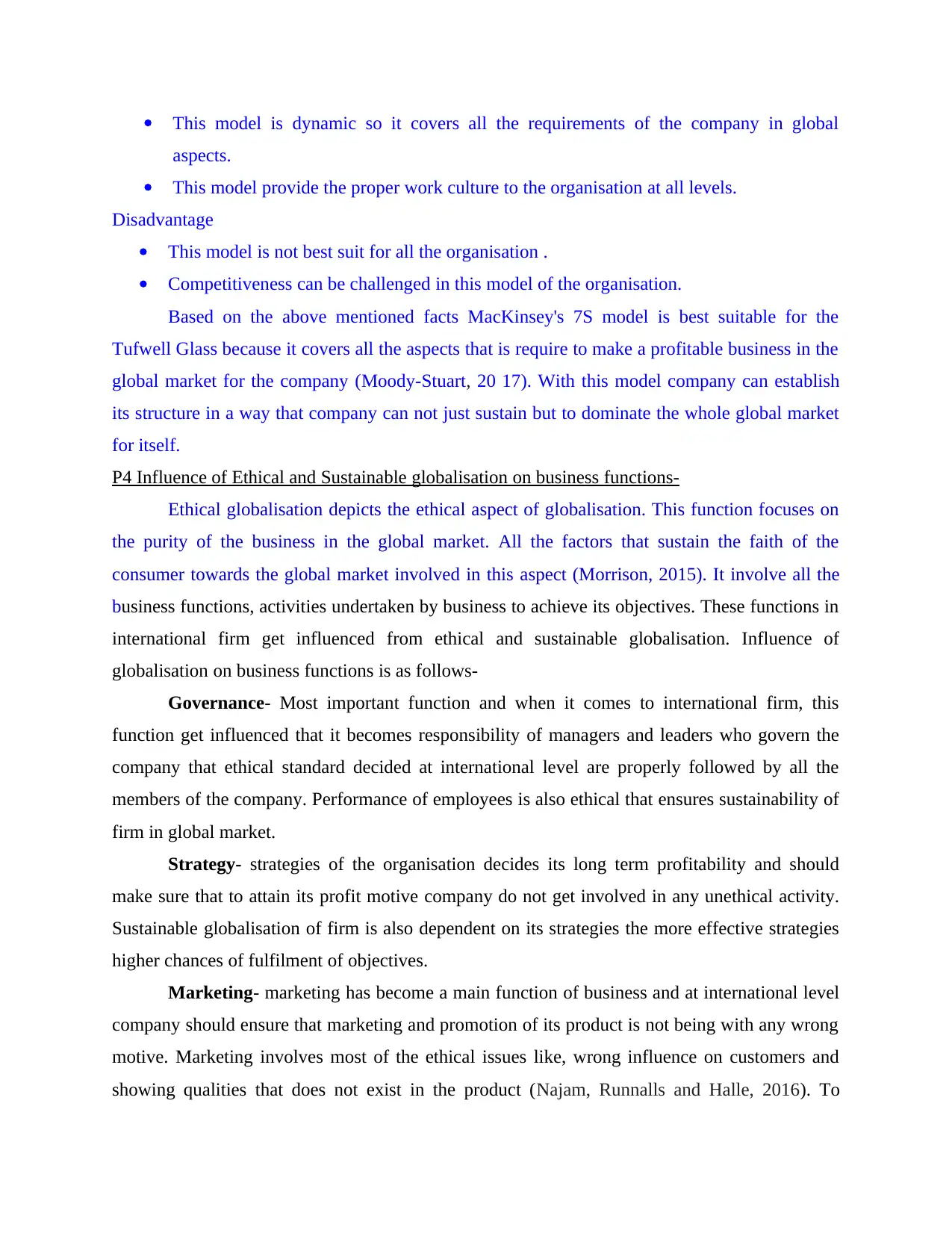
This model is dynamic so it covers all the requirements of the company in global
aspects.
This model provide the proper work culture to the organisation at all levels.
Disadvantage
This model is not best suit for all the organisation .
Competitiveness can be challenged in this model of the organisation.
Based on the above mentioned facts MacKinsey's 7S model is best suitable for the
Tufwell Glass because it covers all the aspects that is require to make a profitable business in the
global market for the company (Moody-Stuart, 20 17). With this model company can establish
its structure in a way that company can not just sustain but to dominate the whole global market
for itself.
P4 Influence of Ethical and Sustainable globalisation on business functions-
Ethical globalisation depicts the ethical aspect of globalisation. This function focuses on
the purity of the business in the global market. All the factors that sustain the faith of the
consumer towards the global market involved in this aspect (Morrison, 2015). It involve all the
business functions, activities undertaken by business to achieve its objectives. These functions in
international firm get influenced from ethical and sustainable globalisation. Influence of
globalisation on business functions is as follows-
Governance- Most important function and when it comes to international firm, this
function get influenced that it becomes responsibility of managers and leaders who govern the
company that ethical standard decided at international level are properly followed by all the
members of the company. Performance of employees is also ethical that ensures sustainability of
firm in global market.
Strategy- strategies of the organisation decides its long term profitability and should
make sure that to attain its profit motive company do not get involved in any unethical activity.
Sustainable globalisation of firm is also dependent on its strategies the more effective strategies
higher chances of fulfilment of objectives.
Marketing- marketing has become a main function of business and at international level
company should ensure that marketing and promotion of its product is not being with any wrong
motive. Marketing involves most of the ethical issues like, wrong influence on customers and
showing qualities that does not exist in the product (Najam, Runnalls and Halle, 2016). To
aspects.
This model provide the proper work culture to the organisation at all levels.
Disadvantage
This model is not best suit for all the organisation .
Competitiveness can be challenged in this model of the organisation.
Based on the above mentioned facts MacKinsey's 7S model is best suitable for the
Tufwell Glass because it covers all the aspects that is require to make a profitable business in the
global market for the company (Moody-Stuart, 20 17). With this model company can establish
its structure in a way that company can not just sustain but to dominate the whole global market
for itself.
P4 Influence of Ethical and Sustainable globalisation on business functions-
Ethical globalisation depicts the ethical aspect of globalisation. This function focuses on
the purity of the business in the global market. All the factors that sustain the faith of the
consumer towards the global market involved in this aspect (Morrison, 2015). It involve all the
business functions, activities undertaken by business to achieve its objectives. These functions in
international firm get influenced from ethical and sustainable globalisation. Influence of
globalisation on business functions is as follows-
Governance- Most important function and when it comes to international firm, this
function get influenced that it becomes responsibility of managers and leaders who govern the
company that ethical standard decided at international level are properly followed by all the
members of the company. Performance of employees is also ethical that ensures sustainability of
firm in global market.
Strategy- strategies of the organisation decides its long term profitability and should
make sure that to attain its profit motive company do not get involved in any unethical activity.
Sustainable globalisation of firm is also dependent on its strategies the more effective strategies
higher chances of fulfilment of objectives.
Marketing- marketing has become a main function of business and at international level
company should ensure that marketing and promotion of its product is not being with any wrong
motive. Marketing involves most of the ethical issues like, wrong influence on customers and
showing qualities that does not exist in the product (Najam, Runnalls and Halle, 2016). To
Paraphrase This Document
Need a fresh take? Get an instant paraphrase of this document with our AI Paraphraser
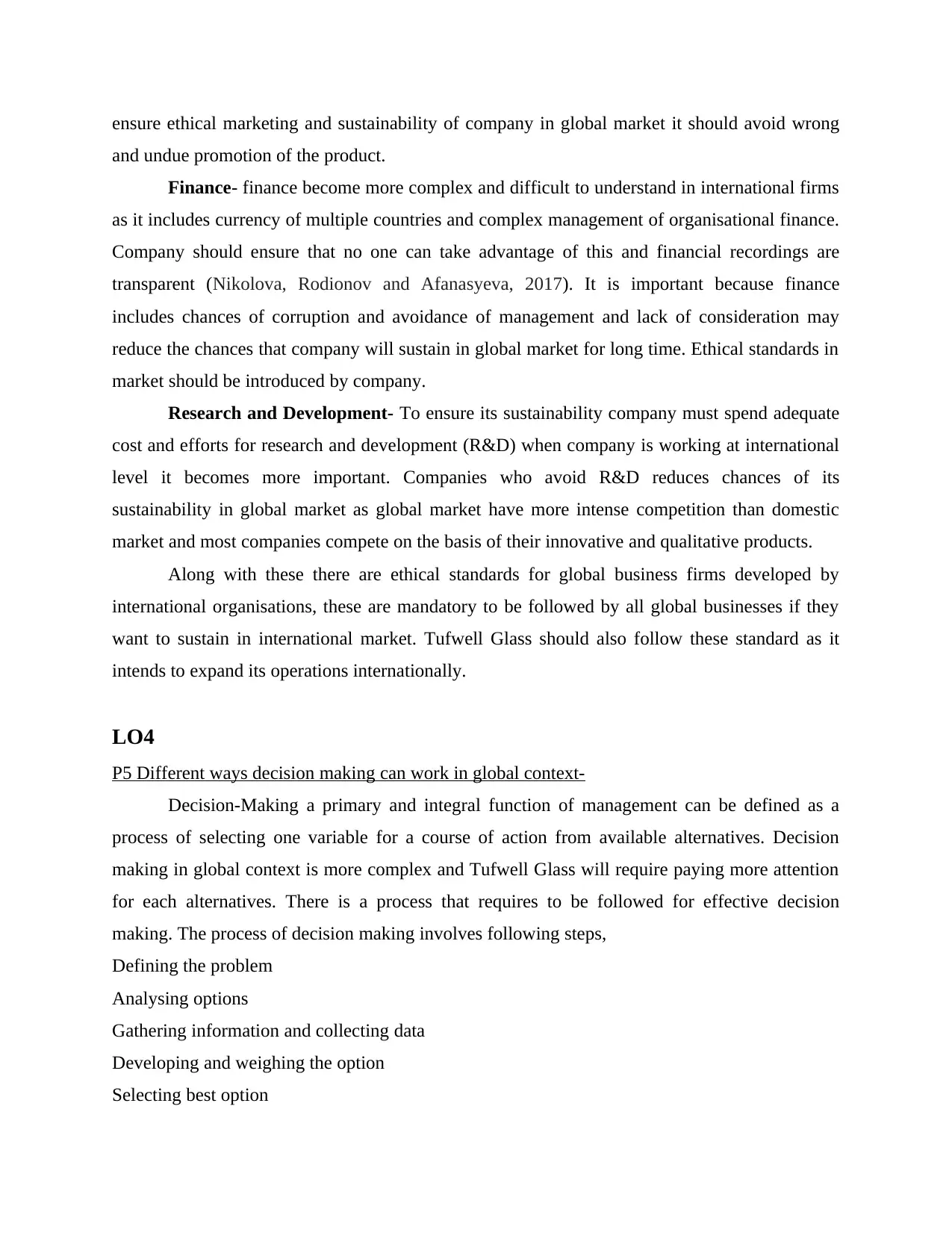
ensure ethical marketing and sustainability of company in global market it should avoid wrong
and undue promotion of the product.
Finance- finance become more complex and difficult to understand in international firms
as it includes currency of multiple countries and complex management of organisational finance.
Company should ensure that no one can take advantage of this and financial recordings are
transparent (Nikolova, Rodionov and Afanasyeva, 2017). It is important because finance
includes chances of corruption and avoidance of management and lack of consideration may
reduce the chances that company will sustain in global market for long time. Ethical standards in
market should be introduced by company.
Research and Development- To ensure its sustainability company must spend adequate
cost and efforts for research and development (R&D) when company is working at international
level it becomes more important. Companies who avoid R&D reduces chances of its
sustainability in global market as global market have more intense competition than domestic
market and most companies compete on the basis of their innovative and qualitative products.
Along with these there are ethical standards for global business firms developed by
international organisations, these are mandatory to be followed by all global businesses if they
want to sustain in international market. Tufwell Glass should also follow these standard as it
intends to expand its operations internationally.
LO4
P5 Different ways decision making can work in global context-
Decision-Making a primary and integral function of management can be defined as a
process of selecting one variable for a course of action from available alternatives. Decision
making in global context is more complex and Tufwell Glass will require paying more attention
for each alternatives. There is a process that requires to be followed for effective decision
making. The process of decision making involves following steps,
Defining the problem
Analysing options
Gathering information and collecting data
Developing and weighing the option
Selecting best option
and undue promotion of the product.
Finance- finance become more complex and difficult to understand in international firms
as it includes currency of multiple countries and complex management of organisational finance.
Company should ensure that no one can take advantage of this and financial recordings are
transparent (Nikolova, Rodionov and Afanasyeva, 2017). It is important because finance
includes chances of corruption and avoidance of management and lack of consideration may
reduce the chances that company will sustain in global market for long time. Ethical standards in
market should be introduced by company.
Research and Development- To ensure its sustainability company must spend adequate
cost and efforts for research and development (R&D) when company is working at international
level it becomes more important. Companies who avoid R&D reduces chances of its
sustainability in global market as global market have more intense competition than domestic
market and most companies compete on the basis of their innovative and qualitative products.
Along with these there are ethical standards for global business firms developed by
international organisations, these are mandatory to be followed by all global businesses if they
want to sustain in international market. Tufwell Glass should also follow these standard as it
intends to expand its operations internationally.
LO4
P5 Different ways decision making can work in global context-
Decision-Making a primary and integral function of management can be defined as a
process of selecting one variable for a course of action from available alternatives. Decision
making in global context is more complex and Tufwell Glass will require paying more attention
for each alternatives. There is a process that requires to be followed for effective decision
making. The process of decision making involves following steps,
Defining the problem
Analysing options
Gathering information and collecting data
Developing and weighing the option
Selecting best option
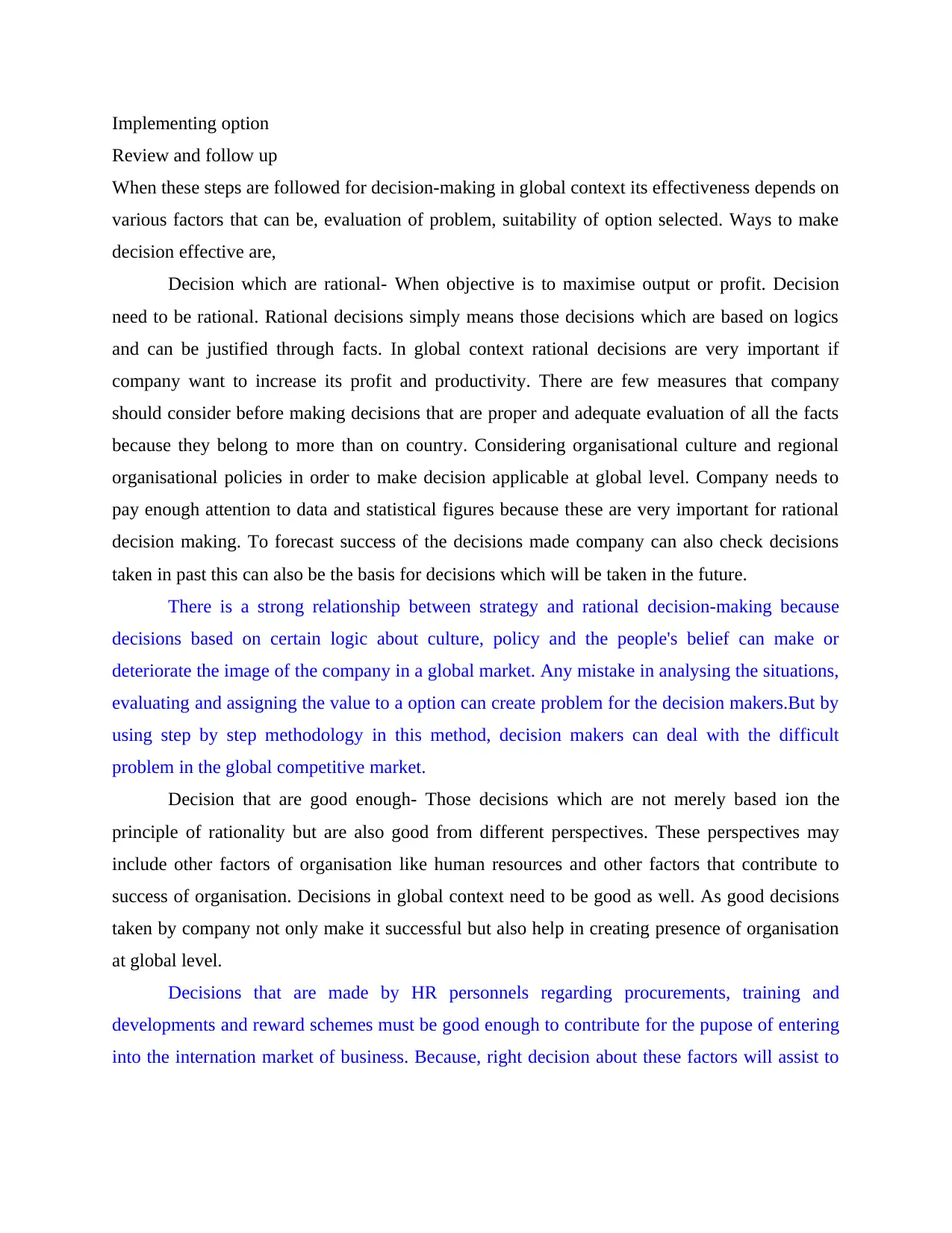
Implementing option
Review and follow up
When these steps are followed for decision-making in global context its effectiveness depends on
various factors that can be, evaluation of problem, suitability of option selected. Ways to make
decision effective are,
Decision which are rational- When objective is to maximise output or profit. Decision
need to be rational. Rational decisions simply means those decisions which are based on logics
and can be justified through facts. In global context rational decisions are very important if
company want to increase its profit and productivity. There are few measures that company
should consider before making decisions that are proper and adequate evaluation of all the facts
because they belong to more than on country. Considering organisational culture and regional
organisational policies in order to make decision applicable at global level. Company needs to
pay enough attention to data and statistical figures because these are very important for rational
decision making. To forecast success of the decisions made company can also check decisions
taken in past this can also be the basis for decisions which will be taken in the future.
There is a strong relationship between strategy and rational decision-making because
decisions based on certain logic about culture, policy and the people's belief can make or
deteriorate the image of the company in a global market. Any mistake in analysing the situations,
evaluating and assigning the value to a option can create problem for the decision makers.But by
using step by step methodology in this method, decision makers can deal with the difficult
problem in the global competitive market.
Decision that are good enough- Those decisions which are not merely based ion the
principle of rationality but are also good from different perspectives. These perspectives may
include other factors of organisation like human resources and other factors that contribute to
success of organisation. Decisions in global context need to be good as well. As good decisions
taken by company not only make it successful but also help in creating presence of organisation
at global level.
Decisions that are made by HR personnels regarding procurements, training and
developments and reward schemes must be good enough to contribute for the pupose of entering
into the internation market of business. Because, right decision about these factors will assist to
Review and follow up
When these steps are followed for decision-making in global context its effectiveness depends on
various factors that can be, evaluation of problem, suitability of option selected. Ways to make
decision effective are,
Decision which are rational- When objective is to maximise output or profit. Decision
need to be rational. Rational decisions simply means those decisions which are based on logics
and can be justified through facts. In global context rational decisions are very important if
company want to increase its profit and productivity. There are few measures that company
should consider before making decisions that are proper and adequate evaluation of all the facts
because they belong to more than on country. Considering organisational culture and regional
organisational policies in order to make decision applicable at global level. Company needs to
pay enough attention to data and statistical figures because these are very important for rational
decision making. To forecast success of the decisions made company can also check decisions
taken in past this can also be the basis for decisions which will be taken in the future.
There is a strong relationship between strategy and rational decision-making because
decisions based on certain logic about culture, policy and the people's belief can make or
deteriorate the image of the company in a global market. Any mistake in analysing the situations,
evaluating and assigning the value to a option can create problem for the decision makers.But by
using step by step methodology in this method, decision makers can deal with the difficult
problem in the global competitive market.
Decision that are good enough- Those decisions which are not merely based ion the
principle of rationality but are also good from different perspectives. These perspectives may
include other factors of organisation like human resources and other factors that contribute to
success of organisation. Decisions in global context need to be good as well. As good decisions
taken by company not only make it successful but also help in creating presence of organisation
at global level.
Decisions that are made by HR personnels regarding procurements, training and
developments and reward schemes must be good enough to contribute for the pupose of entering
into the internation market of business. Because, right decision about these factors will assist to
⊘ This is a preview!⊘
Do you want full access?
Subscribe today to unlock all pages.

Trusted by 1+ million students worldwide
1 out of 18
Related Documents
Your All-in-One AI-Powered Toolkit for Academic Success.
+13062052269
info@desklib.com
Available 24*7 on WhatsApp / Email
![[object Object]](/_next/static/media/star-bottom.7253800d.svg)
Unlock your academic potential
Copyright © 2020–2026 A2Z Services. All Rights Reserved. Developed and managed by ZUCOL.





